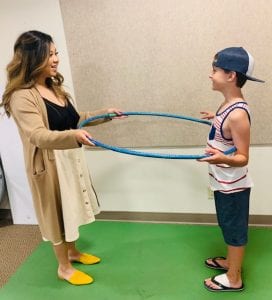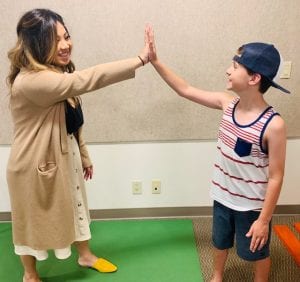Have you ever known someone who repeatedly “invaded” your personal space? They just stand or sit too close in conversation? There is something really uncomfortable about that, even if the person is someone you know and like.
Often I speak with parents who express concerns about their child’s social skills and ability to make and keep friends. While there are many varied skills that go into being a good friend, one of those skills is an awareness and observance of personal social space.
Talking about social space is a good thing, but it’s not very concrete, and a child with these challenges may not really “get” it. A hula-hoop can help make this more visual and concrete.
Step into a hula-hoop and pull it up around your waist, with the hoop touching your back and extending out in front of you, creating a space between you and the child. Tell the child, “This is my space. This is how far away from me you need to be when we talk.” Put the hula-hoop around the child and say, “This is your space. Here’s where I need to be when we talk so I don’t invade your space.”
Make the learning fun. Use the word invade and connect it with your child’s favorite villain in order to understand the word. Then you can practice having conversations without “invading” each other’s space. Use the hula-hoop to check the space until it’s understood. Have the child “show” you his (imaginary) hula-hoop by making an arc with his hands in front of him.
Practice noticing and respecting personal space with family members and close friends. Then, talk about noticing personal space in other places and relationships, by imagining the hula-hoop.
This same idea can be used to help children who tend to grab materials and things that belong to others. Use the hula-hoop to reinforce the understanding that you don’t get to touch or grab things in someone else’s personal space.
Everyone needs a hula-hoop!
Do you have a child who struggles socially and cant seem to make or keep friends? JOIN US for a FREE Parent Information Night to learn how things can change.
Click here for details and RSVP: SLC Parent Night.
“Helping smart but struggling students dramatically improve or completely correct their learning and attention challenges by developing the underlying learning skills that are not supporting the learner well enough.”
We serve children and adults with diagnosed or undiagnosed learning and attention challenges including learning disabilities, dyslexia, ADHD, auditory processing disorders, and autism spectrum disorders.
Jill Stowell, M.S.
Author: At Wit’s End A Parent’s Guide to Ending the Struggle, Tears, and Turmoil of Learning Disabilities
Founder and Executive Director – Stowell Learning Centers
Ready to take the next step?
Speak to a Learning Specialist to learn more about the results from students and parents at Stowell Learning Centers.


